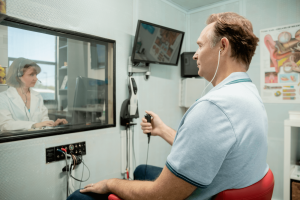|
www.HealthyHearing.com |
What kind of specialist should I see for my hearing loss?ENT? Audiologist? Hearing instrument specialist? Here's what you need to know
Contributed by Joy Victory, managing editor, Healthy Hearing, and Emily Ostrowski, content manager, Healthy Hearing If you are experiencing hearing loss or other ear-related concerns, you may be unsure about what specialist you should see. With numerous titles and specialties—including audiologists, ENTs, and hearing instrument specialists—it can be challenging to know the difference. To help you in your search we have put together a primer about each of their specific roles so you can find the right professional to meet your needs. When to see an audiologistWhat is an audiologist?
loss and can dispense hearing aids. An audiologist is a medical professional with a master's degree, clinical doctorate (AuD) or research-based doctorate (PhD) in audiology from an accredited university. They have extensive education and training in diagnostic testing to identify, evaluate and measure hearing loss and other related disorders, including balance disorders and tinnitus. Why see an audiologist?Consider visiting an audiologist if you are experiencing any of the following:
When to see a hearing instrument specialistWhat is a hearing instrument specialist?A hearing instrument specialist (HIS) is a state-licensed professional who evaluates hearing problems and selects and fits hearing aids. Hearing instrument specialists' practices typically focus on the adult population with common types of hearing loss, often working at retail hearing clinics like Costco or HearingLife. They don't tend to work with children who have hearing loss or adults with more complex hearing loss. Why see a hearing instrument specialist?
Do medical doctors treat hearing loss?Yes. Medical doctors who diagnose and treat hearing loss are known as otolaryngologists and neurotologists. What is an otolaryngologist?An otolaryngologist is also known as an ENT (for ear, nose and throat). They are medical doctors trained in the medical and surgical management of diseases and disorders of the ear, nose, throat and related structures of the head and neck. What about otologists?Some ENTs are known as otologists. Like an otolaryngologist, an otologist is a specialist, but they are further focused on the ears and their related structures. After medical school, they complete further training that allows them to provide medical and surgical care for patients with diseases and disorders that affect the ears, balance system and base of the skull. Why see an otolaryngologist or otologist?Your primary care doctor can handle can treat many of these conditions, but in some cases, you may receive a referral to see an ENT for the following, especially if they're persistent problems:
You may also need to see an otolaryngologist or otologist for adult hearing loss. However, depending on the cause they may refer you to an audiologist or hearing instrument specialist. What is a neurotologist?Closely related to an otologist is a neurotologist. They specialize in surgical intervention for hearing disorders resulting from problems deep within the temporal bone or base of the skull and work with neurosurgeons to correct diseases and disorders of the cranial nerves. Neurotologists can perform surgery to correct complex hearing and balance issues that originate in the brain or nervous system, such as acoustic neuromas or otosclerosis. When your child should see an educational audiologistWhat is an educational audiologist?An educational audiologist is trained to work with children who have hearing loss to ensure they receive the same educational opportunities as their hearing peers. They can help identify a child’s hearing loss and are uniquely qualified to determine the impact hearing loss has on learning. Educational audiologists work as part of a team to develop an Individualized Education Program (IEP) and formulate a plan for the student to receive maximum support in the classroom. This includes recommendations for hearing assistive technology. Other responsibilities might include counseling parents and teachers regarding the child’s hearing loss and individual needs, and educating the school population about hearing loss. Finding help for hearing lossTo help identify the cause of your hearing loss, see our directory of consumer-reviewed hearing aid clinics to find audiologists and hearing instrument specialists near you. If they determine during their evaluation that your hearing issues are complex, they can help connect you with a physician who can help find the best treatment options available. Joy Victory, managing editor, Healthy Hearing
Emily Ostrowski, content manager, Healthy Hearing
|
Featured clinics near me
Hearing Health Solutions from Ohio ENT - Columbus
974 Bethel Rd Ste B
Columbus, OH 43214
Earzlink Hearing Care - Reynoldsburg
7668 Slate Ridge Blvd
Reynoldsburg, OH 43068

Find a clinic
We have more hearing clinic reviews than any other site!


 Joy Victory has extensive experience editing consumer health information. Her training in particular has focused on how to best communicate evidence-based medical guidelines and clinical trial results to the public. She strives to make health content accurate, accessible and engaging to the public.
Joy Victory has extensive experience editing consumer health information. Her training in particular has focused on how to best communicate evidence-based medical guidelines and clinical trial results to the public. She strives to make health content accurate, accessible and engaging to the public.
 Emily is an experienced journalist and medical content writer based in Maine. Passionate about delivering enlightening and accurate content, she is committed to empowering people to make informed choices regarding their hearing health.
Emily is an experienced journalist and medical content writer based in Maine. Passionate about delivering enlightening and accurate content, she is committed to empowering people to make informed choices regarding their hearing health.